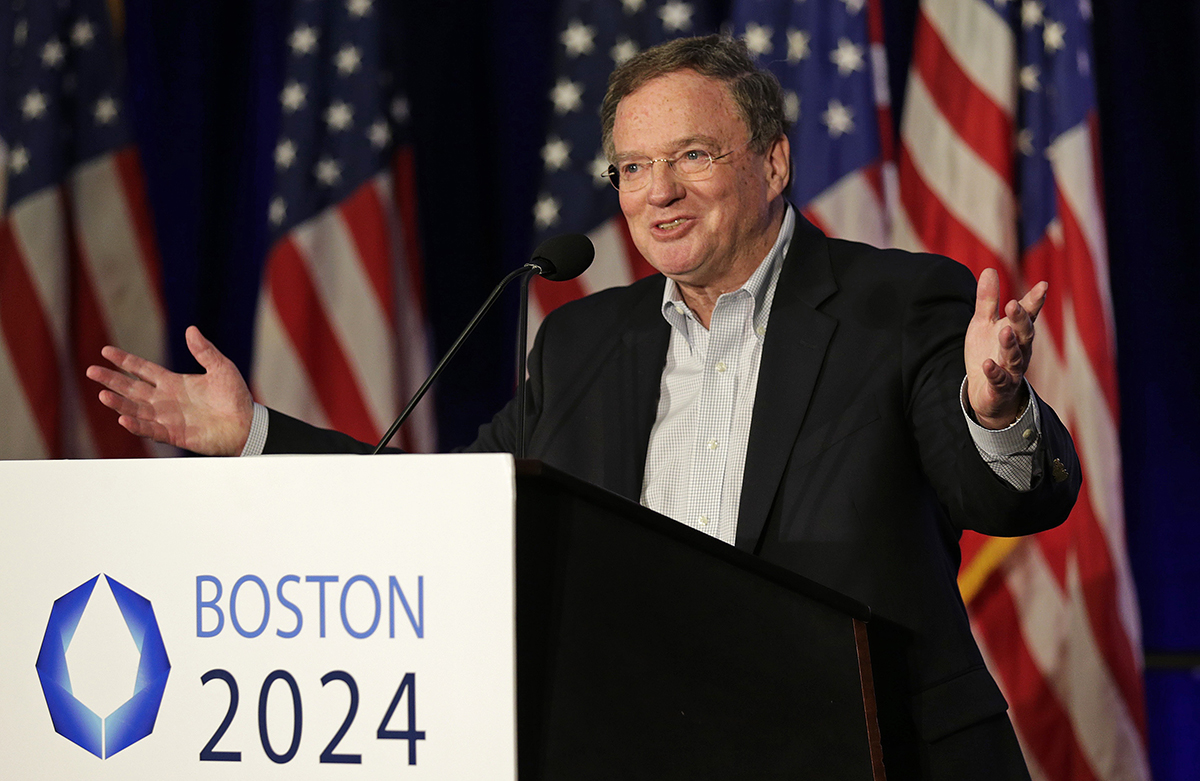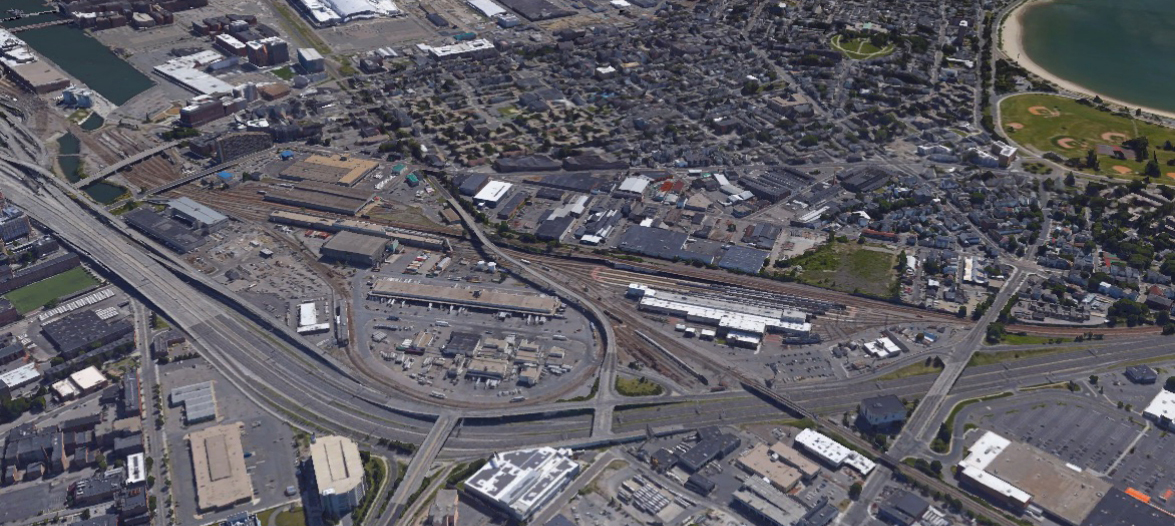Former Boston 2024 CEO Sheds Light on Bid’s Financing, Land Acquisition

Photo via AP
The first four chapters of Boston 2024’s bid book, obtained and published by Boston magazine last month, raised a number of questions regarding the embattled effort to bring the Summer Olympics to Massachusetts. One portion detailing the bid’s plan for financing its venues, redacted from the version presented to the public, makes mention of a public authority needed for land acquisition costs, as well as tax increment financing (TIF) to help erect a temporary, 60,000-seat stadium in Widett Circle.
Though bond experts told the Boston Business Journal that the financing plan laid out in the bid book presented to the United States Olympic Committee contradicts organizers’ guarantee that no public funds would be used for venues, Boston 2024 CEO Rich Davey stood firm in an interview with Boston.com that the redacted portions contained nothing “nefarious.”
Davey’s predecessor, Massachusetts Competitive Partnership President and CEO Dan O’Connell echoed this sentiment in an interview with Boston. O’Connell, who served as Boston 2024’s president and CEO during the bid book’s compilation, explained why district improvement financing (DIF)—one variety of TIF—was especially attractive to organizers in the bid’s early stages, and gave a glimpse into how Boston 2024 was prepared to handle a land holdout in Widett Circle—eminent domain.
“The DIF is a state-authorized statue that allows bonds to be issued that do not carry the full faith and credit of the Commonwealth or the City of Boston, so the taxpayers are not on the line to pay off these bonds if something goes wrong,” O’Connell says. “Tax-exempt bonds are bought by institutions. Banks are a big buyer of them. Bank of America is a big buyer of them around the country. Insurance companies are big buyers of them. They’ll take a lower return for not having to pay taxes on that return.”
The money raised from selling these tax-exempt, 30-year DIF bonds could be used for transit-oriented site improvements, O’Connell argues. He noted that while the Olympic stadium would stand on the site of the current New Boston Food Market warehouse, a deck would need to be constructed to facilitate Red Line and commuter rail service. “It’s expensive. It’s a major infrastructure investment. But you’ve created paths where you can then build hotels, apartments, whatever,” O’Connell says. “Those paths and that deck are important at the time of the Olympics because it’s how you get people from South Station to the stadium, even though the stadium itself sits on the ground.”
O’Connell says he issued more than $1 billion in bonds while head of the Massachusetts Industrial Finance Agency, and that there’s never been a default of a Massachusetts or City of Boston bond: “The only entities that are exposed to risk are the buyers of the bond, and that’s not the public. They are corporate, buyers of the bonds.”
“Special obligation bonds are used in cities and states all over the country and that’s what these would be. So no, there’s no exposure for the taxpayers in the City of Boston or the Commonwealth on the bonds. That’s why we suggested a DIF,” O’Connell says.
Chris Dempsey of No Boston Olympics takes issue with O’Connell’s claim that such a financing plan would not put the public at risk.
“TIFs expose taxpayers to massive financial risk,” Dempsey says. “If the development that Boston 2024 is pushing doesn’t work out as planned, public funds could be used to cover debt payments. What Boston 2024 is saying is that if everything goes according to plan, we won’t have to take money from basic public services, but if things don’t go according to plan, the public is on the hook.”
Still, the DIF is just one option for Boston 2024, and O’Connell, a member of the bid’s board of directors, says he is unsure whether Bid 2.0 will call for one. But what about the line redacted from the bid book that mentioned a public authority would be required for land acquisition? Eminent domain was once considered as a viable option should the New Boston Food Market cooperative fail to reach a consensus to sell its land.
“An issue in the Olympics is always—in other cities and any development where you’re trying to put a site together, Olympics or not—you don’t want to have that one holdout owner in the middle of the site who prevents anything from happening or gets an incredible price per square-foot for their land,” O’Connell says. “The way to avoid that is to have a public authority assemble the land. That authority to assemble, the eminent domain power, is well-established in the United States of America. The courts have reviewed it. It’s in the public interest to prevent that one individual [from] stopping it going forward. Eminent domain has been used by the City of Boston, by the Boston Redevelopment Authority, which has the power to assemble sites and deal with those issues.”
The New Boston Food Market has proven a thorn in the bid’s side. “There is this myth out there somehow that this property is for sale,” Michael Vaughan, the cooperative’s adviser, told the Dorchester Reporter in November. “It’s not for sale. It’s hasn’t been for sale. These are businesses that employ 700 people in good jobs that are year-round jobs that are vital to the food industry in the city of Boston.” The Reporter also reported in January that the businesses of the New Boston Food Market, feeling shut out by Boston 2024 organizers, intend to stay put in Widett Circle. In March, Mayor Marty Walsh vowed he would not use eminent domain for the site.
“The fear was, we had this group of private landowners there, the co-op, and what if one of them—they all have to be unanimous to sell the property—what if one of them holds out and says, ‘I’m not going until a Rolls Royce is delivered to my front door? Then eminent domain power in a public authority would allow you to take it for fair market value. It’s not a bargain. It’s independent appraisal of what the fair market value of the property is at this time, at the time of the taking.”
Though O’Connell made clear that eminent domain is no longer being considered (“That option’s off the table, but it wasn’t off the table at the time we filed the bid book,” he says), that it was ever part of the conversation gives Demspey pause.
“This is another example of Boston 2024 saying one thing behind closed doors and an entirely different thing to the public,” Dempsey says. “We would say it’s shocking that Boston 2024 is now trying to justify eminent domain powers despite their claims of not needing it, but really nothing about Boston 2024’s doublespeak is shocking anymore.”
In a statement following Boston‘s publication of the bid book’s first four chapters, Boston 2024 Vice President Erin Murphy said a “limited amount of proprietary information” had been omitted as required by the USOC, as it would put the bid at a competitive disadvantage. O’Connell related this to the quandary at Widett Circle.
“The bid book that you received has a number that we thought we could get the co-op for. Once the co-op knows that, that’s where the negotiations start, that’s not where the negotiation ends,” O’Connell says. “They went through the book with one of our staffers as well siting there, but the USOC played a principal role and said, ‘This is information we would not want to have out there in terms of negotiations on sites and in terms of perception of where we are in the process with the IOC. We want to put our best foot forward with the IOC.'”




